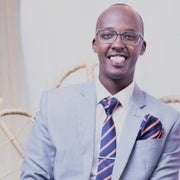The Global Health Delivery Project
Our mission is to improve the health of people everywhere by supporting clinicians at the frontlines to make better decisions and deliver value-based health care using proven approaches and evidence.
Brigham and Women’s Hospital
Division of Global Health Equity
75 Francis Street
Boston, MA 02115
Reaching Every Child in Burundi: An Interview with Dr. Octave Murisho

Dr. Octave Murisho is a fifth year resident in ear, nose, and throat (ENT) surgery at the University of Burundi.
Why did you apply to GHDI?
A colleague who had attended recommended it. I shared a research proposal and my dreams of building a health program in my country, and he said the program would be useful for developing a model and moving forward.
What unique healthcare challenges does your country face?
There are no cleft lip and palate surgeons in Burundi. An international program comes every two years to operate on children, but there is no local surgeon, so we have to send children back home to wait. It makes me very sad very often.
I see many children with hearing impairments. Most are born with hearing loss or defects. The World Health Organization says it is an obligation for every country to have a national program to have hearing tests and diagnosis at birth, but we don’t even have the basic instruments to do the diagnosis.
My father had a rare disease that causes profound hearing loss and vertigo (dizziness). Here in Burundi, we couldn’t find a diagnosis. He had to go to Belgium to find out what he had. That’s why I chose Otolaryngology – to help people in Burundi.
What have you done to address these challenges?
Due to the poor healthcare system in my country, we are forced to invest in ourselves. For example, I had an opportunity to train with a professor in Senegal to learn how to do cleft lip surgery. He taught me how to do the basics so I will soon start volunteering to operate on some children with what we have available. This will allow us to avoid waiting for years for foreigners to come here to operate. In addition, many children are malnourished because of their malformation so we must have an additional nutrition program for children that can’t be operated upon due to a low body mass index.
Is there something in your work that you’re most proud of?
Together with one of my mentors, we started an otolaryngology clinic. We worked twice a month in the north of Burundi, serving a population that cannot afford to come to the capital city.
My specialty is very unique. It treats many senses – hearing, taste, and smell. I treat adults and children using both open and endoscopic surgery. When I finish training, I will be the eighth otolaryngologist in my country with a population of 13 million.
What is something that you want to accomplish in your career?
I want to establish a permanent national program in my country to diagnose hearing loss in every child and treat the children who require surgeries, like cochlear implants.
What would you say to someone who’s just starting out in healthcare in your country?
You must focus on how to help people globally. Don’t just focus on private or public practice. Think about and find the bigger problem you want to solve.
What impact do you think GHDI will have on your career?
GHDI has helped me to gain a deep understanding of my country’s healthcare system and its major challenges. It is just the beginning. I hope to continue developing deeper knowledge in research and implementation.